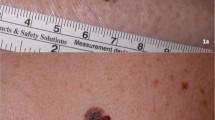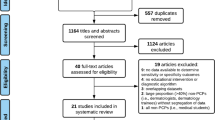Abstract
Introduction
General practitioners (GPs) require the necessary skills to identify potentially malignant skin lesions and refer patients in an appropriate and timely manner. We examined the impact of a single consultant delivered education session to GP trainees on their diagnosis of common skin lesions.
Methods
A prospective analysis of baseline knowledge was assessed using a photographic questionnaire. A dedicated education session was delivered by a consultant plastic surgeon. Their knowledge was re-assessed after 3 months.
Results
There were 23 participants. Baseline ability to correctly diagnose skin lesions improved significantly at 3 months following dedicated teaching (baseline mean 30.2%, 3-month mean 65.9%, p = 0.001). All trainees recommended that dedicated skin education should be incorporated into GP training curricula.
Conclusion
Dedicated education sessions on skin lesions can improve the diagnostic accuracy of GP trainees, and we suggest that they are incorporated into the GP training curriculum.




Similar content being viewed by others
References
Basarab T, Munn SE, Jones RR (1996) Diagnostic accuracy and appropriateness of general practitioner referrals to a dermatology out-patient clinic. Br J Dermatol 135(1):70–73
NCCP. National non-melanoma skin cancer GP referral guideline: HSE; 2015 [1:[accessed 18/12/15 2015
NCRI. Cancer in Ireland (2013) Annual report of the National Cancer Registry Cork. In: 2013
Beecher S, O’Leary D, McLaughlin R (2015) Increased risk environment for emergency general surgery in the context of regionalization and specialization. Int J Surg 21:112–114
Burge S (2004) Teaching dermatology. Clin Exp Dermatol 29(2):206–210
Speelman C, Martin K, Flower S, Simpson T (2010) Skill acquisition in skin cancer detection. Percept Mot Skills 110(1):277–297. https://doi.org/10.2466/pms.110.1.277-297 [published Online First: 2010/04/16]
Badertscher N, Braun RP, Held U, et al. Diagnostic competence of Swiss general practitioners in skin cancer. Swiss medical weekly 2013;143:w13834. doi: https://doi.org/10.4414/smw.2013.13834 [published Online First: 2013/07/31]
Beecher SM, Donlan C, O’Leary DP et al (2015) Clinical and economic benefit of general practitioner integration to a symptomatic breast service. Ir J Med Sci. https://doi.org/10.1007/s11845-015-1386-2 [published Online First: 2015/11/26]
Salisbury C, Noble A, Horrocks S et al (2005) Evaluation of a general practitioner with special interest service for dermatology: randomised controlled trial. BMJ (Clin Res ed) 331(7530):1441–1446. https://doi.org/10.1136/bmj.38670.494734.7C [published Online First: 2005/12/08]
Thind CK, Brooker I, Ormerod AD (2011) Teledermatology: a tool for remote supervision of a general practitioner with special interest in dermatology. Clin Exp Dermatol 36(5):489–494. https://doi.org/10.1111/j.1365-2230.2011.04073.x [published Online First: 2011/04/22]
Morton CA, Downie F, Auld S, Smith B, van der Pol M, Baughan P, Wells J, Wootton R (2011) Community photo-triage for skin cancer referrals: an aid to service delivery. Clin Exp Dermatol 36(3):248–254. https://doi.org/10.1111/j.1365-2230.2010.03960.x [published Online First: 2010/11/13]
Hill VA, Wong E, Hart CJ (2000) General practitioner referral guidelines for dermatology: do they improve the quality of referrals? Clin Exp Dermatol 25(5):371–376. https://doi.org/10.1046/j.1365-2230.2000.00665.x
Acknowledgements
Thank you to all the GP trainees who kindly participated in this study. We are grateful to their trainer, Dr. Frank O’Leary, for facilitating the education session. The authors would also like to thank Anthony Edwards, the clinical photographer, for performing the photography.
Author information
Authors and Affiliations
Corresponding author
Ethics declarations
Conflict of interest
The author declares that she has no conflict of interest.
Informed consent
Informed consent was obtained from all individual participants included in the study.
Rights and permissions
About this article
Cite this article
Beecher, S.M., Keogh, C. & Healy, C. Dedicated general practitioner education sessions can improve diagnostic capabilities and may have a positive effect on referral patterns for common skin lesions. Ir J Med Sci 187, 959–963 (2018). https://doi.org/10.1007/s11845-018-1788-z
Received:
Accepted:
Published:
Issue Date:
DOI: https://doi.org/10.1007/s11845-018-1788-z




